|
|
General: MEXI-CAN=VATI-CAN=TEOTIHUA-CAN=KUKULCAN=CANAAN (BODA DE CANA=OCTAVO DIA=GUSANO)
Elegir otro panel de mensajes |
|
|
 |
| The seaside view of El Castillo at Tulum |
For thousands of years, the largest structures on Earth were pyramids: the Great Pyramid of Khufu in Egypt, is the only one of the Seven Wonders of the Ancient World still remaining.
Pyramids are being constructed since Upper Paleolithic, about 45,000-10,000 years ago to modern days. The first humans used mammoths’ bones, stones and/or pieces of wood as construction material for their pyramid-like structures.
Pyramids are the most stable constructions, and man learned how to imprint some information on it, writing on its walls, or even by the way they’ve constructed it.
Why were pyramids built?
Basically, ancient Egypt pyramids came from the mastabas, tombs used for the burials of pharaohs and their queens.
The first pyramid was made by stacking a mastaba on top of a slightly larger one. Mastabas were relatively low, rectangular, flat-roofed, roughly bench-shaped burial mounds for the pre-Dynastic pharaohs or nobility. Mastabas, which were made of mud brick or stone, were visible monuments, with the actual burial chamber under ground.
During the fourth dynasty, after the construction of the first pyramid, monuments were erected as a signal of prosperity. Tall, glorious, and expensive structures were built as a testament to the society that they represented, and also the rulers who lead those societies. In Egypt, pyramids were erected as a tribute to the glory of the civilization by the Nile.
Pyramids were also related to the religion of the time, Egyptian pyramids held many personal items of the deceased in preparation for his afterlife.
Some other structures in Central America were used as astronomical observatories and benchmarks.
Many have said that some pyramids are mathematical compendium incorporating all kinds of astronomical and cosmological formulas of each civilization.
Although many of these factual findings and conclusions are related to pseudoscientific research, we may consider formulas incorporated in pyramids as "intentional”.
Contrary to common beliefs, the largest pyramid by volume is not the Great Pyramid of Giza; it is the Cholula pyramid in the state of Puebla.

Known as Tlachihualtepetl (Nahuatl for "artificial mountain"), Cholula is a huge complex located in Mexico. Is the largest archaeological site of a pyramid (temple) in the New World. The pyramid stands 55 meters (180 ft) above the surrounding plain, and in its final form it measured 400 by 400 meters (1,300 by 1,300 ft). The pyramid is a temple that has traditionally been viewed as having been dedicated to the god Quetzalcoatl. The architectural style of the building was closely linked to that of Teotihuacan in the Valley of Mexico.
But of course, Egyptians achieved State-of-the art in matters of pyramids construction.
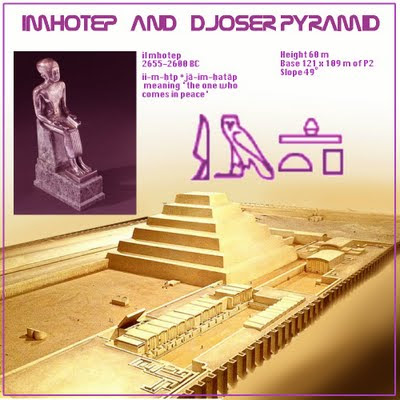 The name behind the construction of the first pyramid was Imhotep, a priest and physician; credited with many miraculous healings.Although he achieved great fame during his lifetime, Imhotep's renown continued to grow after his death. He eventually achieved status of a god among Egyptians.He is best known today as the architect who began the "age of pyramids" in Egypt. He designed and supervised the building of the step pyramid complex at Saqqara, which is believed to be the first colossal stone edifice ever built, but ancient Egypt’s chief attraction still the Great Pyramid of Giza.It has been said that the dimensions of the Great Pyramid of Giza incorporate measurements from which the Earth's size and shape can be calculated, as well as the distance between the Earth and the moon and the distance between the Earth and the sun.The Great Pyramid of Giza, also called Khufu’s Pyramid or Cheops was built entirely of limestone, and is considered an architectural masterpiece. It contains around 1,300,000 blocks ranging in weight from 2.5 tons to 15 tons and is built on a square base with sides measuring about 230 m (755 ft), covering 13 acres. Its four sides face the four cardinal points precisely and it has an angle of about 51 degrees. The original height of the Pyramid was c.146.5 m (488 ft), but today it is only 137 m (455 ft) high, the 9 m (33 ft) that is missing is due to the theft of the fine quality limestone covering, or casing stones to build houses and Mosques in Cairo.Find here some nice statistics about the Pyramid of Khufu:- The sides of all three of the Giza pyramids were astronomically oriented to be north-south and east-west within a small fraction of a degree; The name behind the construction of the first pyramid was Imhotep, a priest and physician; credited with many miraculous healings.Although he achieved great fame during his lifetime, Imhotep's renown continued to grow after his death. He eventually achieved status of a god among Egyptians.He is best known today as the architect who began the "age of pyramids" in Egypt. He designed and supervised the building of the step pyramid complex at Saqqara, which is believed to be the first colossal stone edifice ever built, but ancient Egypt’s chief attraction still the Great Pyramid of Giza.It has been said that the dimensions of the Great Pyramid of Giza incorporate measurements from which the Earth's size and shape can be calculated, as well as the distance between the Earth and the moon and the distance between the Earth and the sun.The Great Pyramid of Giza, also called Khufu’s Pyramid or Cheops was built entirely of limestone, and is considered an architectural masterpiece. It contains around 1,300,000 blocks ranging in weight from 2.5 tons to 15 tons and is built on a square base with sides measuring about 230 m (755 ft), covering 13 acres. Its four sides face the four cardinal points precisely and it has an angle of about 51 degrees. The original height of the Pyramid was c.146.5 m (488 ft), but today it is only 137 m (455 ft) high, the 9 m (33 ft) that is missing is due to the theft of the fine quality limestone covering, or casing stones to build houses and Mosques in Cairo.Find here some nice statistics about the Pyramid of Khufu:- The sides of all three of the Giza pyramids were astronomically oriented to be north-south and east-west within a small fraction of a degree; - Pi - Pi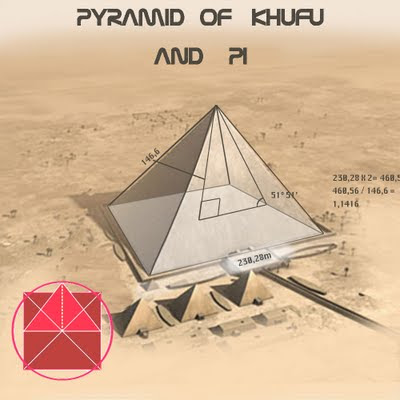 The pyramid of Cheops have a base length of 230,28 m, and a height of 146.6 m. If you take two times the base length, and divide this by the height, you get a value of Pi "3,14161..." the mathematical constant whose value is the ratio of any circle's circumference to its diameter;- Golden Ratio – Phi The pyramid of Cheops have a base length of 230,28 m, and a height of 146.6 m. If you take two times the base length, and divide this by the height, you get a value of Pi "3,14161..." the mathematical constant whose value is the ratio of any circle's circumference to its diameter;- Golden Ratio – Phi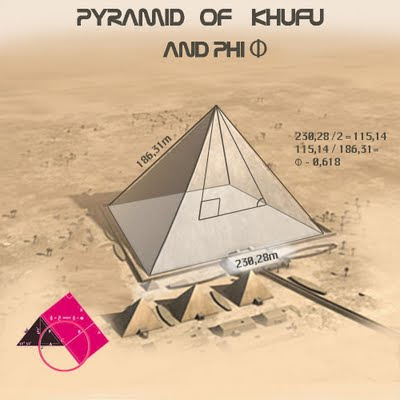 We could also find Golden Section (1:1.618), a unique ratio (or relationship between parts) that seems to be preferred by nature as the best geometry for growth, energy conservation, elegance and has some fundamental relationships to the platonic solids. Al we have to do is divide the length of the base (230.28m) by 2 and then divide it by the apothem (the altitude of a face, from ground to the top);- Center of Earth We could also find Golden Section (1:1.618), a unique ratio (or relationship between parts) that seems to be preferred by nature as the best geometry for growth, energy conservation, elegance and has some fundamental relationships to the platonic solids. Al we have to do is divide the length of the base (230.28m) by 2 and then divide it by the apothem (the altitude of a face, from ground to the top);- Center of Earth The Pyramid lies in the center of gravity of the continents. It also lies in the exact center of all the land area of the world, dividing the earth's land mass into approximately equal quarters.The north-south axis (31 degrees east of Greenwich) is the longest land meridian, and the east-west axis (30 degrees north) is the longest land parallel on the globe. There is obviously only one place that these longest land-lines of the terrestrial earth can cross, and it is at the Great Pyramid! This is incredible, one of the scores of features of this mighty structure which begs for a better explanation.- Perfectly placed stonesThe average casing stone on the lowest level was 5 ft. long by 5 ft. high by 6 ft. deep and weighed 15 tons. The casing stones weighing as much as 20 tons were placed with an accuracy of 5/1000ths of an inch, and an intentional gap of about 2/100ths of an inch for mortar;- From far awayHigh quality limestone was used for the outer casing, with some of the blocks weighing up to 15 tones. This limestone came from Tura, about 8 miles away on the other side of the Nile. Granite quarried nearly 500 miles away in Aswan with blocks weighing as much as 60-80 tones, was used for the portcullis doors and relieving chambers;- Chambers above ground levelThe Great Pyramid is the only pyramid to have chambers above ground level. The Pyramid lies in the center of gravity of the continents. It also lies in the exact center of all the land area of the world, dividing the earth's land mass into approximately equal quarters.The north-south axis (31 degrees east of Greenwich) is the longest land meridian, and the east-west axis (30 degrees north) is the longest land parallel on the globe. There is obviously only one place that these longest land-lines of the terrestrial earth can cross, and it is at the Great Pyramid! This is incredible, one of the scores of features of this mighty structure which begs for a better explanation.- Perfectly placed stonesThe average casing stone on the lowest level was 5 ft. long by 5 ft. high by 6 ft. deep and weighed 15 tons. The casing stones weighing as much as 20 tons were placed with an accuracy of 5/1000ths of an inch, and an intentional gap of about 2/100ths of an inch for mortar;- From far awayHigh quality limestone was used for the outer casing, with some of the blocks weighing up to 15 tones. This limestone came from Tura, about 8 miles away on the other side of the Nile. Granite quarried nearly 500 miles away in Aswan with blocks weighing as much as 60-80 tones, was used for the portcullis doors and relieving chambers;- Chambers above ground levelThe Great Pyramid is the only pyramid to have chambers above ground level. The arrangement of the pyramids is a disputed representation of the Orion constellation. Hancock and Bauval in their book explain that the ‘air’ shafts inside the Great Pyramid aligned to the stars in the Belt of Orion and the pole star around 2500 BC.  The southern shaft from the Queens Chamber aligned with the star Sirius at its culmination point on the meridian. This star was very important to the Egyptians and was associated with the mother Goddess Isis. The southern shaft emanating from the Kings Chamber aligned with the brightest star of the Orion Belt Zeta Orionis. This star was associated with the Egyptian God of resurrection and rebirth Osiris! The northern shafts aligned to the ancient pole star Alpha Draconis (Kings Chamber) and to Beta Ursa Minor (Queens Chamber);- Indicates equinoxes The southern shaft from the Queens Chamber aligned with the star Sirius at its culmination point on the meridian. This star was very important to the Egyptians and was associated with the mother Goddess Isis. The southern shaft emanating from the Kings Chamber aligned with the brightest star of the Orion Belt Zeta Orionis. This star was associated with the Egyptian God of resurrection and rebirth Osiris! The northern shafts aligned to the ancient pole star Alpha Draconis (Kings Chamber) and to Beta Ursa Minor (Queens Chamber);- Indicates equinoxes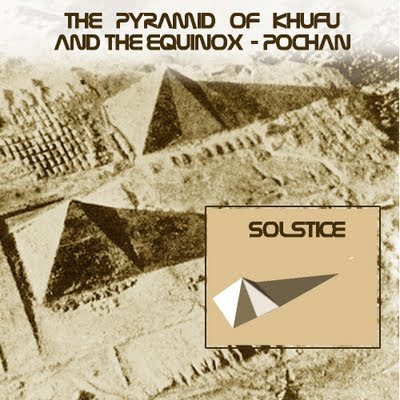 At dawn and sunset at the time of the equinoxes (around 21 March and 22 Sept), a shadow appears on the south face of the great pyramid, apparently dividing it in half, with the shaded side nearest the sun. The phenomenon occurs because the core-masonry is concave on all four faces by a yard deep. The casing stones that exist show clearly that the finished surface wasn't concave. This strange feature was first illustrated in La Description de l'Egypte in the late 1700's (Volume V, pl. 8). Flinders Petrie noticed a hollowing in the core masonry in the center of each face and wrote that he "continually observed that the courses of the core had dips of as much as ½° to 1°" (The Pyramids and Temples of Gizeh, 1883, p. 421). Though it is apparently more easily observed from the air, the concavity is measurable and is visible from the ground under favorable lighting conditions.- Pyramid power At dawn and sunset at the time of the equinoxes (around 21 March and 22 Sept), a shadow appears on the south face of the great pyramid, apparently dividing it in half, with the shaded side nearest the sun. The phenomenon occurs because the core-masonry is concave on all four faces by a yard deep. The casing stones that exist show clearly that the finished surface wasn't concave. This strange feature was first illustrated in La Description de l'Egypte in the late 1700's (Volume V, pl. 8). Flinders Petrie noticed a hollowing in the core masonry in the center of each face and wrote that he "continually observed that the courses of the core had dips of as much as ½° to 1°" (The Pyramids and Temples of Gizeh, 1883, p. 421). Though it is apparently more easily observed from the air, the concavity is measurable and is visible from the ground under favorable lighting conditions.- Pyramid power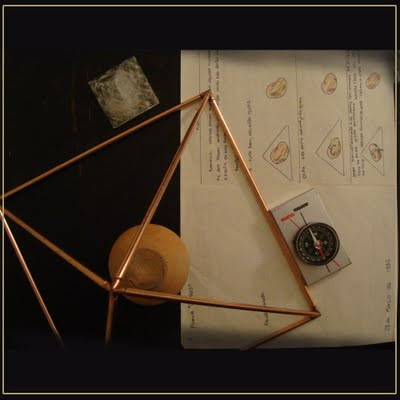
At the end of 70's Luiz Pagano father gifted him a cooper pyramidThere are many pseudoscientific theories in wich pyramids harnesses cosmic energy (or Universal Life Force Energy) and preserves it in its bosom. The idea that using small models of pyramids can improve health, improve the growth of seeds and plants, preserve food, sharpen or maintain the sharpness of razor blades, among others, was initiated in the 1930s by French hardware store owner and pendulum dowsing author Antoine Bovis.Pyramid should be oriented correctly with one of its face facing the north and the base should be perfectly aligned with the needle of a compass, Cosmic Energy gets more accumulated at 1/3rd height from the base of the Pyramid, the so called King's Chamber region.In 2005, an episode of MythBusters a test of pyramid power was performed, using pyramids built according to the specifications found in the Great Pyramid. Of course the show busted the myth, but strangely enough a half apple placed under the pyramid rots slower than the half they left in the open, force them to remake the experiment, and they didn’t perform the seed growth experiment (this one always worked in my tests as seen in my 1982 annotations caught on photo).There are lots and lots of pyramids in Egypt… And around the world:Pyramid of Chichen Itza in Mexico – one of the new 7 wonders of the World Mexico amazing historical Pyramid Chichen Itza was constructed by the pre-Columbian Maya someday among the 10th and 13th centuries AD, El Castillo served as a temple to the god Kukulkan, the Yucatec Maya Feathered Serpent deity carefully associated with the deity determine Quetzalcoatl identified to the Aztecs and different important Mexican cultures of the Postclassic period.Chichen Itza can be a step pyramid with a floor plan of squared terraces with stairways up each of the 4 facets to the temple on top. Nice sculptures of plumed serpents run down the edges of the northern staircase, and are set off by way of shadows from the nook stages at the spring and autumn equinoxes. Chichen Itza, this pyramid has 91 steps on 3 of the perimeters and 92 on the north staircase, which provides as much as 365 steps, or days of the year.The Mexican executive restored the pyramid in the 1920s and 1930s, concurrent with the Carnegie Establishment’s restoration of the Temple of Warriors. Archaeologists had been in a position to reconstruct two sides of this Chichen Itza pyramid in their entirety. Mexico amazing historical Pyramid Chichen Itza was constructed by the pre-Columbian Maya someday among the 10th and 13th centuries AD, El Castillo served as a temple to the god Kukulkan, the Yucatec Maya Feathered Serpent deity carefully associated with the deity determine Quetzalcoatl identified to the Aztecs and different important Mexican cultures of the Postclassic period.Chichen Itza can be a step pyramid with a floor plan of squared terraces with stairways up each of the 4 facets to the temple on top. Nice sculptures of plumed serpents run down the edges of the northern staircase, and are set off by way of shadows from the nook stages at the spring and autumn equinoxes. Chichen Itza, this pyramid has 91 steps on 3 of the perimeters and 92 on the north staircase, which provides as much as 365 steps, or days of the year.The Mexican executive restored the pyramid in the 1920s and 1930s, concurrent with the Carnegie Establishment’s restoration of the Temple of Warriors. Archaeologists had been in a position to reconstruct two sides of this Chichen Itza pyramid in their entirety.
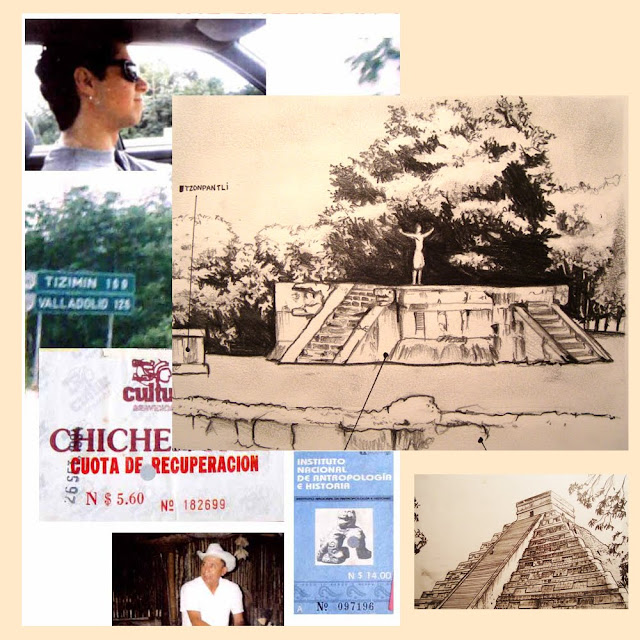 |
| Luiz Pagano travel to to Chichen Itza Sep/1994 |
Through digging from the top, they discovered another temple buried beneath the current one. Within the Chichen Itza temple chamber is a Chac Mool statue and a throne in the shape of jaguar, painted red with spots made from inlaid jade. The Mexican government excavated a tunnel from the base of the north staircase, up the in advance pyramid’s stairway to the hidden temple, and opened it to tourists.
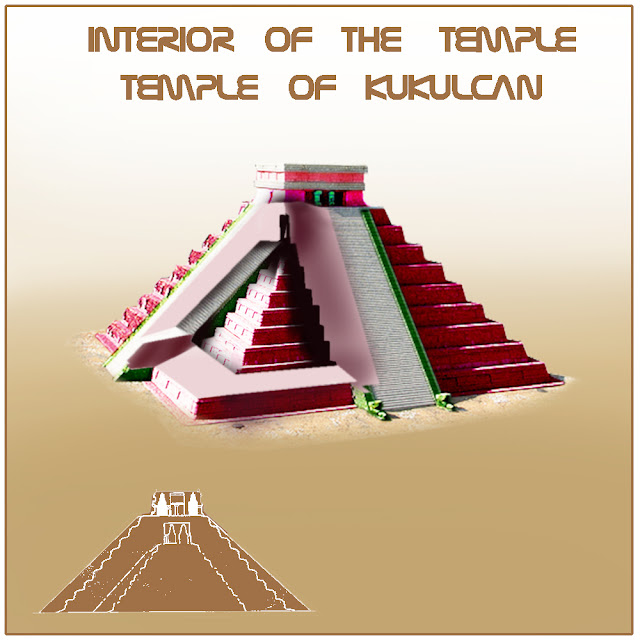 In up to date years, the National Institute of Anthropology and History (INAH), which manages the archaeological website online of Chichen Itza, has been final monuments to public access. At the same time as visitors can stroll round them, they may be able to no longer climb them or pass within their chambers. Mountaineering El Castillo used to be halted in 2006 after an 80-year old woman fell to her death. On the similar time INAH closed the general public access to the throne room.The staircases rise at an angle of 45 degrees to the horizontal, while the average inclination of the stepped pyramid itself is 53.3 degrees. The faces of the individual steps are sloped at a greater angle, approximately 73 degrees. The faces of the individual steps are sloped at a greater angle, approximately 73 degrees. - The nine main platforms of the pyramid are thought to represent the 18 months of the haab, and the 52 panels represent the number of years it takes for a calendar round date to recur.Height: 24m - top platform (+6m with the temple);The construction is 24 m high, the square base measures 55.3 m across;The temple at the top of the pyramid is 6 m high, 13.42 m wide, and 16.5 m long.The Pyramid of Kukulcan also has some facts imprinted on its structures:- The days of the yearEl Castillo's design is thought to relate to the Mayan calendar. Each of the four faces incorporates a broad, steep staircase consisting of 91 steps that ascends to the top platform. Counting the top platform as an additional step gives a total of 365 steps: 1step for each day of the year.- Indicates equinoxes - The nine main platforms of the pyramid are thought to represent the 18 months of the haab, and the 52 panels represent the number of years it takes for a calendar round date to recur.Height: 24m - top platform (+6m with the temple);The construction is 24 m high, the square base measures 55.3 m across;The temple at the top of the pyramid is 6 m high, 13.42 m wide, and 16.5 m long.The Pyramid of Kukulcan also has some facts imprinted on its structures:- The days of the yearEl Castillo's design is thought to relate to the Mayan calendar. Each of the four faces incorporates a broad, steep staircase consisting of 91 steps that ascends to the top platform. Counting the top platform as an additional step gives a total of 365 steps: 1step for each day of the year.- Indicates equinoxes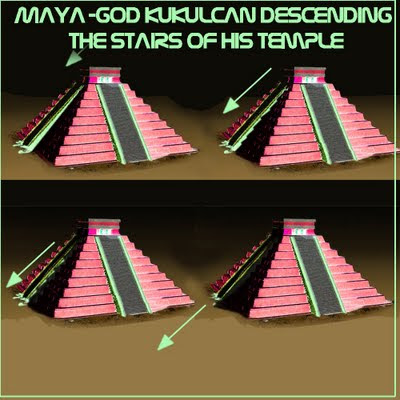 The shadow-serpent appear the slide down the steps of the north balustrade.The word for a snake's rattle, Tzab, is the same word for the Pleiades. In addition, research by Jose Diaz Bolio indicated that some Yucatecan rattlesnakes have a strange little three-dot marking in a circle near the rattlel. This symbol was read by Bolio as a solar ahau face, a symbol of the sun. Now, when the serpent shadow appears, if we wish to imagine the snake's tail, it must pierce the temple on top of the pyramid (the fifth, central direction-the zenith direction) and then it points up into the center of the sky (see diagram). Since the rattle is called tzab (Pleiades) and the three-dot ahau face design is the sun, the symbolism states unequivocally: sun and Pleiades in the zenith.This alignment doesn't occur on the equinoxes, but at Chichen Itza it occurs on May 20th in the 21st century. The point is that the pyramid "points", with this symbolism, to an astronomical alignment that occurs in a specific precessional era. As such, the Pyramid of Kukulcan is a precessional star clock constructed in stone.Pyramids of Louvre The shadow-serpent appear the slide down the steps of the north balustrade.The word for a snake's rattle, Tzab, is the same word for the Pleiades. In addition, research by Jose Diaz Bolio indicated that some Yucatecan rattlesnakes have a strange little three-dot marking in a circle near the rattlel. This symbol was read by Bolio as a solar ahau face, a symbol of the sun. Now, when the serpent shadow appears, if we wish to imagine the snake's tail, it must pierce the temple on top of the pyramid (the fifth, central direction-the zenith direction) and then it points up into the center of the sky (see diagram). Since the rattle is called tzab (Pleiades) and the three-dot ahau face design is the sun, the symbolism states unequivocally: sun and Pleiades in the zenith.This alignment doesn't occur on the equinoxes, but at Chichen Itza it occurs on May 20th in the 21st century. The point is that the pyramid "points", with this symbolism, to an astronomical alignment that occurs in a specific precessional era. As such, the Pyramid of Kukulcan is a precessional star clock constructed in stone.Pyramids of Louvre
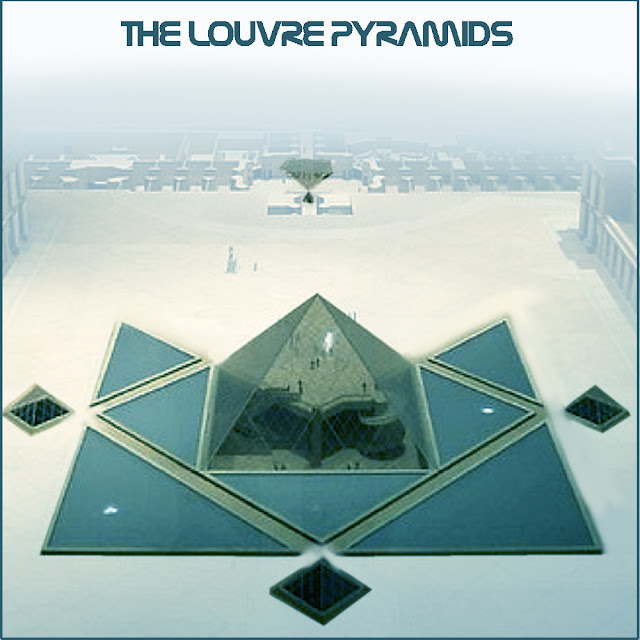 The third pyramid I would like to mention is the Louvre pyramid, a modern large glass and metal pyramid, surrounded by three smaller pyramids, in the main courtyard (Cour Napoléon) of the Louvre Palace. Was commissioned by the President of France François Mitterrand in 1984, it was designed by the architect I. M. Pei.The pyramid and the underground lobby beneath it were created because of a series of problems with the Louvre's original main entrance, which could no longer handle an enormous number of visitors on an everyday basis. Visitors entering through the pyramid descend into the spacious lobby then re-ascend into the main Louvre buildings. Several other museums have duplicated this concept, most notably the Museum of Science and Industry in Chicago.- Louvre Pyramides facts:The Louvre Pyramid is a pyramid with a square base.Height: 21.65 mLength of the base: 35 mTilt angle: 51.7 degrees;- The Legend of 666 windowsThis legend has its roots back in the 80s, when the official brochure was published, during its construction; it actually cited the number 666. But it was a mistaken number. The direction of the Louvre Museum confirmed that the complete pyramid has a total of 673 glass plates (603 diamonds and 70 triangles).David A. Shugart, in other hand, counts 689 3. It was made several statements, leading to varying results, all of them presenting more than 666; La Pyramide Inversée (The Inverted Pyramid) La Pyramide Inversée (The Inverted Pyramid) It is a magnificent skylight, considered a smaller sibling of the more famous Louvre Pyramid, yet turned upside down.The pyramid marks the intersection of two main walkways and orients visitors towards the museum entrance. Tensioned against a 30-ton, 13.3-meter square steel caisson frame, the inverted pyramidal shape in laminated glass points downward towards the floor. The tip of the pyramid is suspended 1.4 meters (a little more than 4.5 feet) above floor level. Individual glass panes in the pyramid, 30 mm thick, are connected by stainless-steel crosses 381 mm in length. After dark, the structure is illuminated by a frieze of spotlights.Directly below the tip of the downwards-pointing glass pyramid, a small stone pyramid (about one meter/three feet high) is stationed on the floor, as if mirroring the larger structure above: The tips of the two pyramids almost touch. It is a magnificent skylight, considered a smaller sibling of the more famous Louvre Pyramid, yet turned upside down.The pyramid marks the intersection of two main walkways and orients visitors towards the museum entrance. Tensioned against a 30-ton, 13.3-meter square steel caisson frame, the inverted pyramidal shape in laminated glass points downward towards the floor. The tip of the pyramid is suspended 1.4 meters (a little more than 4.5 feet) above floor level. Individual glass panes in the pyramid, 30 mm thick, are connected by stainless-steel crosses 381 mm in length. After dark, the structure is illuminated by a frieze of spotlights.Directly below the tip of the downwards-pointing glass pyramid, a small stone pyramid (about one meter/three feet high) is stationed on the floor, as if mirroring the larger structure above: The tips of the two pyramids almost touch. Brown was not the first writer to offer esoteric interpretations of the Inverted Pyramid. In Raphaël Aurillac's work Le guide du Paris maçonnique the author declares that the Louvre used to be a Masonic temple. To Aurillac, the various glass pyramids constructed in recent decades include Masonic symbolism. Aurillac sees the downward-pointing pyramid as expressing the Rosicrucian motto V.I.T.R.I.O.L. (Visita Interiorem Terrae Rectificandoque / Invenies Occultum Lapidem, "Visit the interior of the earth and… you will find the secret stone"). Another writer on Masonic architecture, Dominique Setzepfandt, sees the two pyramids as suggesting "the compass and square that together form the Seal of Solomon" (quoted in Code Da Vinci: L'enquête by Marie-France Etchegoin and Frédéric Lenoir), Brown was not the first writer to offer esoteric interpretations of the Inverted Pyramid. In Raphaël Aurillac's work Le guide du Paris maçonnique the author declares that the Louvre used to be a Masonic temple. To Aurillac, the various glass pyramids constructed in recent decades include Masonic symbolism. Aurillac sees the downward-pointing pyramid as expressing the Rosicrucian motto V.I.T.R.I.O.L. (Visita Interiorem Terrae Rectificandoque / Invenies Occultum Lapidem, "Visit the interior of the earth and… you will find the secret stone"). Another writer on Masonic architecture, Dominique Setzepfandt, sees the two pyramids as suggesting "the compass and square that together form the Seal of Solomon" (quoted in Code Da Vinci: L'enquête by Marie-France Etchegoin and Frédéric Lenoir),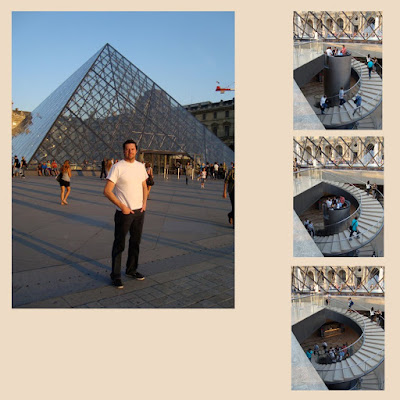
Luiz Pagano at Louvre Aug 2010Whether it is built to consolidate power of the Pharaoh or to accumulate the energy of the universe, fact is that the pyramids will be always related as a symbol of mystery and power of our planet.
EVERYTHING IS CONNECTED AND THERE ARE NO COINCIDENCES |
|
|
|
|
ISLA SAN GIORGIO (VENECIA)=GEORGE LEMAITRE
GEMATRIA EN INGLES DE SEED=33
GEMATRIA EN INGLES DE GATE=33
SARA (CE-SAREA DE FILIPO)=PARALELO 33
"¡Oh profundidad de las riquezas de la sabiduría (sophia)
y de la ciencia (gnwsiV, gnosis) de Dios!
¡Cuán incomprensibles son sus juicios, e inescrutables sus caminos!"
(Romanos, 11: 33).
 the Apple
| milky way in Simple Gematria Equals: 119 |
( |
m 13 |
i9 |
l 12 |
k 11 |
y 25 |
0 |
w 23 |
a1 |
y 25 |
) |
| queen mary in Simple Gematria Equals: 119 |
( |
q 17 |
u 21 |
e5 |
e5 |
n 14 |
0 |
m 13 |
a1 |
r 18 |
y 25 |
|
| hebrew calendar in Simple Gematria Equals: 119 |
( |
h8 |
e5 |
b2 |
r 18 |
e5 |
w 23 |
0 |
c3 |
a1 |
l 12 |
e5 |
n 14 |
d4 |
a1 |
r 18 |
| mary magdalene in Simple Gematria Equals: 119 |
( |
m 13 |
a1 |
r 18 |
y 25 |
0 |
m 13 |
a1 |
g7 |
d4 |
a1 |
l 12 |
e5 |
n 14 |
e5 |
|

|
|
|
 Primer Primer
 Anterior
62 a 76 de 91
Siguiente Anterior
62 a 76 de 91
Siguiente Último
Último
|
|
| |
|
|
©2024 - Gabitos - Todos los derechos reservados | |
|
|

